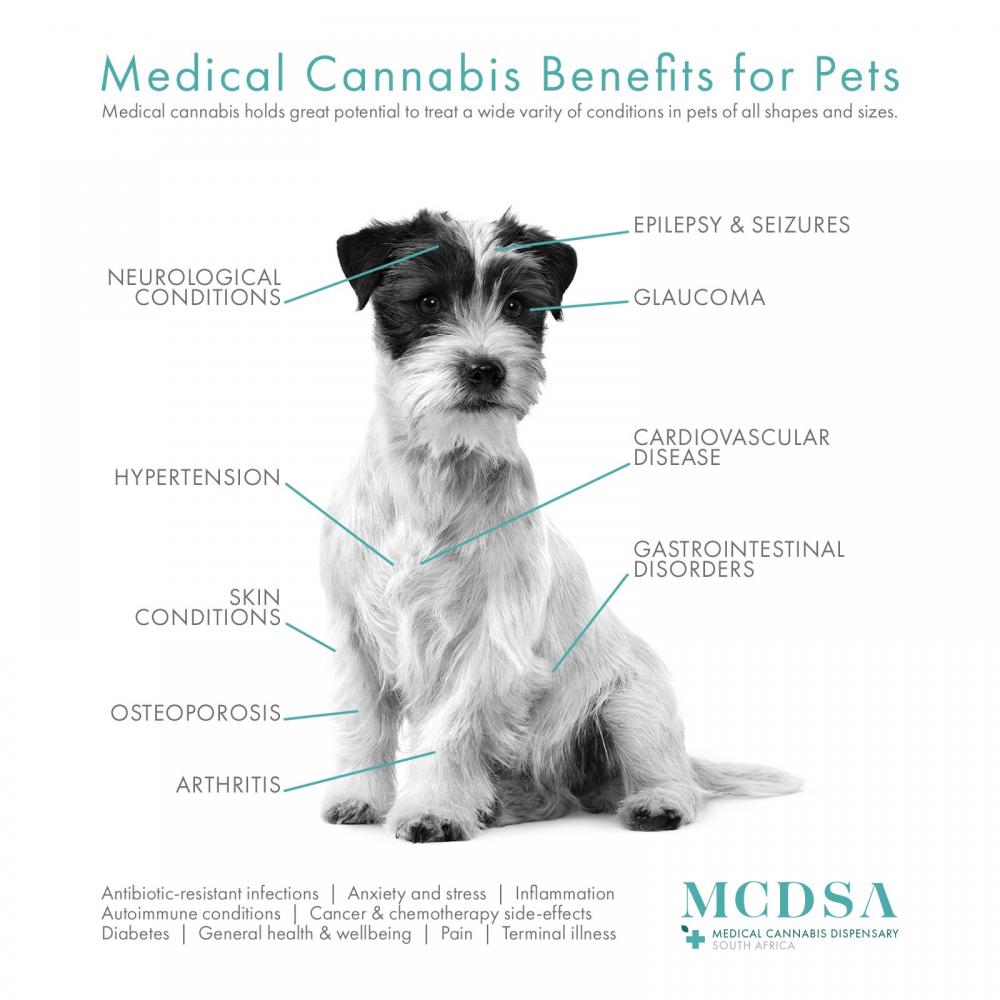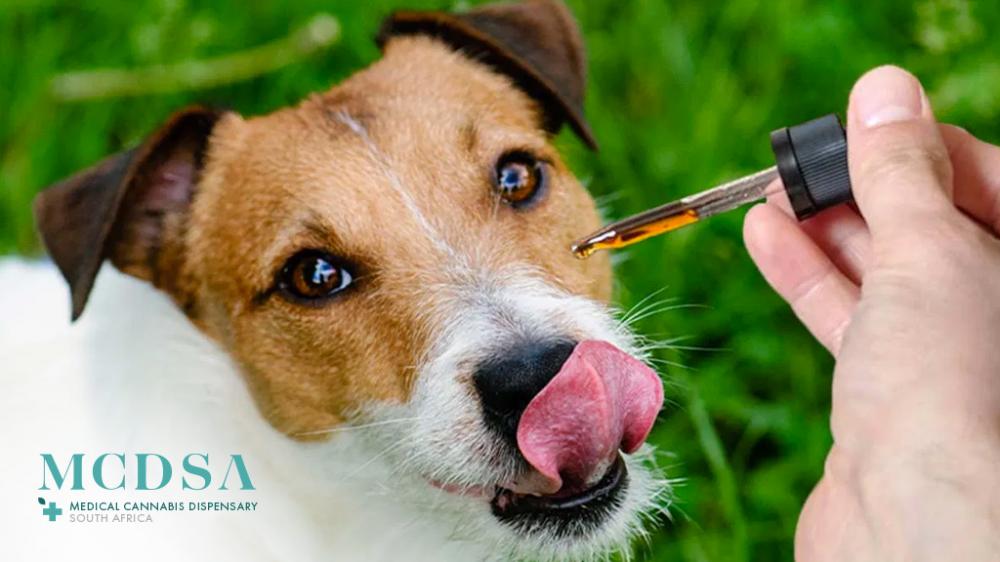Medical Cannabis for Pets
Pets are not exempt from the modern-day onslaught of disease-causing toxins and chemicals. As with humans, conventional medicine often fails them. Medical cannabis research on animals is currently limited but promising. Convincing anecdotal reports are aplenty for treating many challenging conditions, though caution is key.
With widespread legalisation and destigmatisation, information is spreading rapidly on the medicinal value of marijuana-derived products for treating a wide range of health symptoms and conditions. However, this information is understandably aimed at humans and does not translate directly into treating our beloved pets.
In this Article
Pets in the Modern World
At Medical Cannabis Dispensary South Africa (MCDSA), we understand the special, loving bonds formed between people and animals. It is no exaggeration to say that pets become part of the family – a man or woman’s best friend. When they fall ill, they rely entirely on us to notice changes in their behaviour. This may be something obvious, such as constant scratching, an eye infection, walking gingerly, or a painful yelp when touching a tender area.
However, we often do not realise when an underlying disease is developing because they are unable to verbalise subtle symptoms to us. Veterinarians often fall short in this regard, too, with people insisting something is wrong with their beloved pet, only for a visit to the vet proving expensive and unfruitful.
Like humans, our furry and non-furry companions are exposed to an onslaught of modern-day toxins and chemicals, such as pesticides, heavy metals, overuse of antibiotics, household chemicals, fluoride in drinking water, etc. Most people do not even think twice about putting down a bowl of processed, artificially-nutritious pellets or preservative-filled canned food.
It is understandable, with the daily time pressures and high cost of living in recent times. Most people struggle to feed themselves in a healthy and nutritious manner. Also, advanced marketing schemes lead us to believe that what we are feeding our animals is perfectly normal and even healthy. So, when inevitable health challenges arise, the responsibility falls on our shoulders. Pet owners agree that we must focus on the safest and most natural treatment options available.

Marijuana as Veterinary Medicine
Veterinarians and doctors in South Africa are not allowed to prescribe medical cannabis, as it is still considered illegal for the time being. However, products derived from “hemp” may be regarded as nutritional supplements, unregulated yet scarcely prescribed.
Research into the therapeutic effects of this plant’s compounds – including cannabinoids like THC and CBD – on humans is steadily advancing. Scientific evidence for cannabis as veterinary medicine is rare. One wrongly-interpreted cause for over-optimism is the fact that most medicines making it to human trials tend to be conducted on animals first. While results are promising for a host of conditions in rodent populations, it is irresponsible to assume that they correlate to other species.
We do know that each human and animal body has an “endocannabinoid system”, which allows for the therapeutic effects of cannabis compounds – they mimic those produced naturally by the body (read more about this in Cannabis Science). However, there is significant variability in the biochemical make-up of humans and animals and between different animal species.
This species variability means that the ability of a dog, cat or horse to metabolise marijuana differs significantly from our own. Dogs, for example, have higher concentrations of CB1 receptors (the primary target for psychoactive THC) in the brain compared to humans. Also, cats cannot tolerate the pain medications prescribed to dogs. This highlights the need for species-specific research and treatment.
What the Research Says
Bad news first: Unfortunately, early studies on cannabis and pets have focused on toxicity rather than potential benefits. With growing legislation and the invention of highly concentrated products, incidences of accidental animal exposure to toxic quantities of THC are rising.
Dogs have a tendency to “wolf down” anything edible and are the most commonly affected, usually via ingestion of edibles, with evidence dating back as far as 1978. They are prone to severe reactions to THC at large dosages, mainly due to high concentrations of CB1 receptors in the brain. Symptoms almost always present as neurological (99%) and frequently as gastrointestinal (30%).
Common signs of canine exposure include:
- Depression
- Excessive salivation
- Dilated pupils
- Uncoordinated movements
- Vomiting
- Urinary incontinence
- Tremors
- Hypothermia
- Slow heart rate
Higher dosages may cause agitation, involuntary eye movements, rapid breathing and heart rate, impaired balance or movement, hyperexcitability and seizures. In one case, a dog required temporary breathing assistance after ingesting a concentrated synthetic cannabinoid product, resulting in more severe clinical signs than dogs that ingest marijuana flowers (note that synthetic products are chemically manufactured rather than naturally extracted).
There is a case report of a cat that suffered from agitation and other unpleasant side effects after exposure to THC-rich cannabis smoke. Fortunately, after recovering in hospital, it made a full recovery and was able to return home.
The good news: CBD is backed by scientific evidence as safe for animal use. One of the earliest pet studies showed this compound’s ability to treat arthritic dogs. Specifically, 2mg/kg of body weight, taken twice daily, lessened pain and improved activity in osteoarthritis cases. Given CBD’s profound effect on human epilepsy and seizures, this area holds promise for animal research. A recent study showed that CBD administration significantly reduced seizure frequency in dogs and more studies are inbound.
Studies on rabbits, dogs and monkeys showed cannabinoids as a therapeutic target for reducing intraocular pressure. Faint scientific evidence also shows promise for cannabis as a treatment aid for inflammation, pain, skin conditions and cancer.
Let us set the record straight: blowing toxic smoke in your pet’s face or attempting to get it “high” in any way is incredibly cruel and may even be harmful. It is no laughing matter. With modern advances in medical marijuana and the invention of highly-concentrated products, there is even more reason to take extreme caution and keep products safely stored, far out of reach of animals. Act urgently in case of accidental exposure and get to a veterinary clinic (a 24-hour one, if necessary).
Busting the Myth: Is Cannabis Lethal?
Information without context can be very misleading, so here are the facts. A literature search reveals that cannabis-related deaths have been reported in two dogs, a cat, and a horse. In the case of the dogs, both were relatively small and consumed baked goods containing highly-concentrated THC cannabis butter along with an unknown quantity of chocolate – which is known to be toxic to dogs.
In fact, eating as much as a small bar of chocolate can have serious consequences for a small dog. Interestingly, the treatment for ingesting high THC concentrations is similar to that of ingesting chocolate – often involving forced vomiting, activated charcoal, IV fluids and monitoring. However, we are not discounting the fact that medical marijuana can be harmful in highly concentrated doses.
The reported cat and horse deaths were likely attributable to secondary causes rather than cannabis ingestion alone. The cat’s death was likely due to cardiomyopathy complications. The horse showed signs of colic, although a necropsy was not performed to confirm the cause of death. The toxicology brief concluded that “the prognosis is favourable for symptomatic animals with no complications” and that they “usually recover within 72 hours” with supportive care.
Take note: A dose does not need to be lethal to be toxic or harmful. Reports of toxicosis from concentrated medical THC products causing severe symptoms are a reason to be concerned. The key to safe and effective medical marijuana use in pets is to approach dosing cautiously and slowly increase intake.
Keep in mind that the reported fatal dose for dogs was more than 3000mg/kg of body weight, and it has been reported elsewhere that doses of 3000-9000mg/kg were not fatal. Medical products are carefully dosed, one drop at a time. A high-quality 10ml tincture may contain around 3mg of cannabis concentrate per drop or 600mg THC concentrate in total. So, the minimum lethal dose for a 30kg Golden Retriever would be roughly 150 entire tinctures – an outrageous quantity.
Based on the facts, we can conclude that medical cannabis use in pets appears safe when approached cautiously and dosed accurately. The toxicity of chocolate to dogs is one good reason to keep your marijuana products and chocolate stashed together safely out of reach of animals.

Medical Cannabis Use in Pets
The medical marijuana journey in pets often follows the same path as humans. Conventional medicine has failed, or owners seek to avoid unfavourable side-effects of harmful drugs like anti-inflammatory (NSAIDs). You want what is best for your animal, which often means seeking natural alternatives.
We understand that people are desperate to ease their animals’ suffering and improve their quality of life. Our most common pet clientele are dogs, cats and horses, but our oils have been used safely on many species of all shapes and sizes – even rodents. While scientific evidence is lacking, anecdotal reports are aplenty. However, precaution is essential. The decision to use medical cannabis should always be one based on:
- Educated opinion – do your own research online and seek the input of a supportive, local veterinarian who understands the potential of cannabis-based therapies for treating the specific condition at hand.
- Risk versus reward – cannabinoid products provide natural alternatives to medicines with unwanted side effects and may be preferable to ease an animal’s suffering, especially in the case of a debilitating or terminal illness. But scientific evidence is still catching up.
CBD oil is the most popular choice for animals. It is considered safe and effective for treating various medical conditions in children and even babies when necessary. Its vast therapeutic potential crosses all boundaries of species, age and gender. There is little doubt that future studies will show CBD to be an effective tool for treating pets with anxiety, autoimmune conditions, cancer and several other health conditions.
Crucially, CBD is non-psychoactive, meaning it does not cause the famous cannabis “high”. In fact, it binds weakly to specific receptor sites (CB1) in the brain, thereby preventing the cannabinoid THC from causing its famed intoxicating effect. This makes high CBD, low THC strains very valuable for medicinal applications.
CBG is an up-and-coming cannabinoid that does not cause psychoactivity and offers tremendous therapeutic potential. There are many reports of pet owners using THC to treat their animals successfully. THCA is the precursor to THC and can be used as a non-psychoactive alternative – therapeutic effect without affecting the state of mind.
Pets with the following conditions may benefit from medical cannabis:
- Antibiotic-resistant infections
- Anxiety and stress
- Arthritis
- Autoimmune conditions
- Cancer and chemotherapy side-effects
- Cardiovascular disease
- Diabetes
- Epilepsy and seizures
- Gastrointestinal disorders
- General health and wellbeing
- Glaucoma
- Hypertension (high blood pressure)
- Inflammation
- Neurological conditions
- Osteoporosis
- Pain
- Skin conditions
- Terminal illness
Please see our Treatment Guideline for Pets for more information on potential conditions and dosing.
Reliable and controlled dosing is essential for the wellbeing of your companion. We are able to recommend full-extract cannabis oil (FECO) products of the purest and highest quality available on the South African market – alcohol-free, with no chemical residues, and safe for pets.
See our Product Guide for more information, or contact us below to start your pet’s medical marijuana journey now. If you have any further questions, we will do our best to assist.
Disclaimer
All information on this page is subject to MCDSA’s disclaimer.



